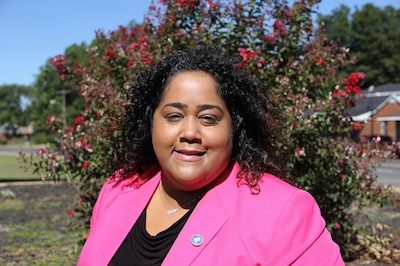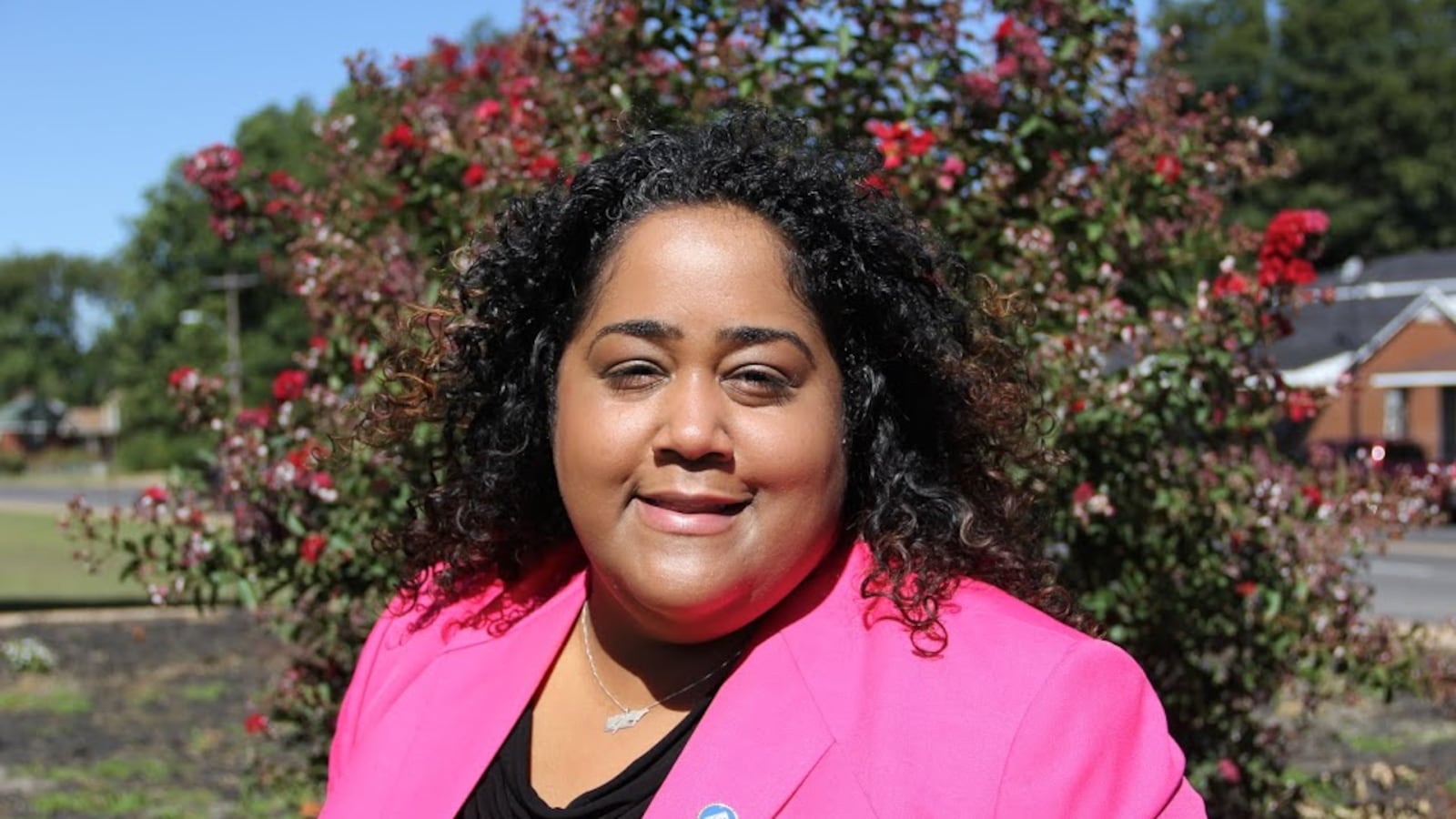State Rep. Raumesh Akbari sits at ease in principal Monekea Smith’s office at Hamilton High School, down the road from Graceland, across the street from Akbari’s grandmother’s house — and nearly four hours and a world away from the state Capitol, where she spends much of her time.
When Smith speaks with a school colleague on her walkie-talkie and signs off “Love Hamilton,” Akbari instinctively offers up the appropriate response: “Absolutely!”
Only someone familiar with the storied Memphis school and its culture would know that “Love Hamilton, Absolutely!” is Hamilton’s longstanding motto, emblazoned on the school’s walls and often exchanged by alumni.
Akbari has both a deep knowledge of the community she represents and a deep appreciation for policy, enabling her to straddle two worlds and connect them in a way that leads to meaningful change.
“If you cannot identify with people or with a problem, then it’s difficult for you to create policy that can solve it,” Akbari says later, explaining how she’s been able to find impactful legislative solutions to public education challenges in Memphis.
In the last five years, the legislature has passed a slew of laws targeting the state’s lowest performing schools, many of which are in Memphis.
Against that backdrop this spring, Akbari shepherded into law a policy change that ended up protecting 10 struggling-but-improving schools from state intervention. It also brought clarity to the complex and often contentious school turnaround process under the Tennessee Achievement School District.
In so doing, the Memphis Democrat managed to build consensus among lawmakers and state leaders, including founding ASD Superintendent Chris Barbic, in favor of the school turnaround game-changer.
“Her just reaching out initially and having a conversation before it even got to the point of a bill was great,” Barbic said. “That doesn’t always happen.”

At age 31, Akbari (her name rhymes with blackberry) is the youngest member of the legislature and also an attorney. She has quickly risen to become one of the legislature’s most effective voices on educational issues — despite rarely raising her voice in House Education meetings or on the House floor.
In addition to holding public office, she works for Akbari Corp., started in 1981 by her Iranian-born father and Memphian mom. Most of Akbari’s mother’s family attended Hamilton. She jokes that someone from her family graduated from the school every year during the 1970s.
Like many of the schools in Akbari’s district, Hamilton is a priority school, meaning it ranks academically among the bottom 5 percent of schools statewide. Hamilton also is part of Shelby County Schools’ Innovation Zone, the local district’s own school turnaround initiative.
During her recent school visit, Akbari and Hamilton’s principal enjoyed an instant rapport based on mutual acquaintances and a fluency in Memphis institutions, especially schools. Because of Akbari’s roots, she understands Memphians’ intense loyalty to neighborhood schools, and why the suggestion of state intervention unleashes feelings of confusion, frustration and even anger.
Akbari herself is a product of Memphis-area schools. She attended Chimney Rock Elementary, Cordova Middle and Cordova High schools before receiving her college degree at Washington University in St. Louis and a law degree from St. Louis University. But she always knew that one day she would return home. In high school, she had participated in the Memphis Challenge program encouraging students with high ACT scores to settle eventually in Memphis to serve their city.
Because of her 12 years in Memphis City and legacy Shelby County Schools, Akbari has a nuanced view of public education.
“I’m a product of the city and county schools, and I know what public schools can do,” she says. “It will be a disservice if we don’t invest in these schools.”
She also knows firsthand the schools’ weaknesses.
“When I got to Wash U, I did not feel as prepared as other students. I had a high ACT score, a high GPA, but other students were a little bit more prepared,” she recalls.
Akbari didn’t expect to become politically involved at such a young age. But the House seat in her district suddenly opened up when longtime Rep. Lois DeBerry died in 2013. Then 29, Akbari claimed 89 percent of the vote to defeat an independent candidate. She successfully retained the seat the following year in a regular election.
During her campaigns, the state’s new Achievement School District was a top concern among constituents worried about the state encroaching on neighborhood schools, even those that are chronically underperforming. Because the ASD had not been in existence during her school years, Akbari had to do her homework.
One of the schools in her district, Alcy Elementary, was being considered for ASD charter conversion because of low performance, or to be closed by Shelby County Schools because of declining enrollment. However, when Akbari visited Alcy and talked with the principal, she saw a school that was improving — and test scores bore that out.
“If a school is on the priority list, but they’re making changes, it’s not worth it to take them through the stress of turnaround,” she said. “That’s not a good use of the ASD’s resources.”
Akbari drafted a bill that would let a school try its own turnaround, rather than being taken over by the statewide district, if the school received top-level TVAAS value-added growth scores of 4 or 5, replaced the principal, or was designated a community school that offers non-academic services such as physical and mental health services.

Armed with feedback from her Memphis constituents and Shelby County school board members, she workshopped the bill with Barbic and the Tennessee Department of Education. She knew if they gave the nod, she’d get other lawmakers’ support.
“If I don’t get something people are willing to support, then I’m going to be failing at the starting line,” she said. “I could file something to prove a point or raise awareness, but it’s not going to be able to pass.”
The bill eventually was streamlined to include the TVAAS provision. And, of the 22 bills filed in 2015 aimed at changing ASD operations, it was the only one to pass. In fact, it cleared both chambers unanimously.
The seemingly innocuous bill has had a surprisingly tangible impact in the state’s two largest cities. Because of the new law, when the ASD unveiled its newest targets this fall for takeover and conversion, seven schools in Memphis and three in Nashville were no longer eligible and instead were given time to improve on their own.
“It is tremendous,” said Shante Avant, a Shelby County Schools board member of the new law, which she said gives local educators and students a sense of empowerment. “It means to them that they have come together as a community and made things happen.”
Barbic said the law has helped state turnaround efforts, too — by making the criteria for state intervention clearer. That, in turn, has made the ASD more transparent.
“Before, we could explain all we wanted and I think [the criteria for turnaround] was objective, but folks felt it lacked transparency,” he said. “Now, it’s clear. It’s black and white.”

